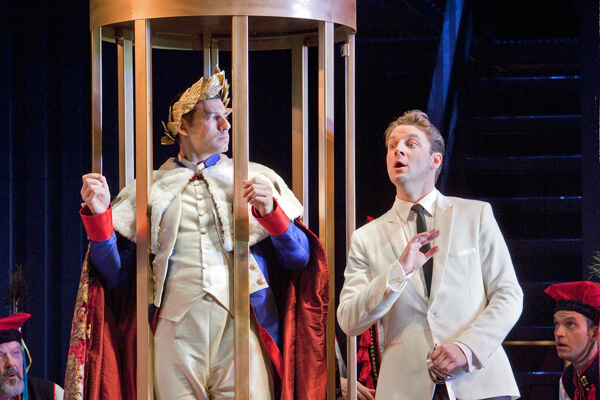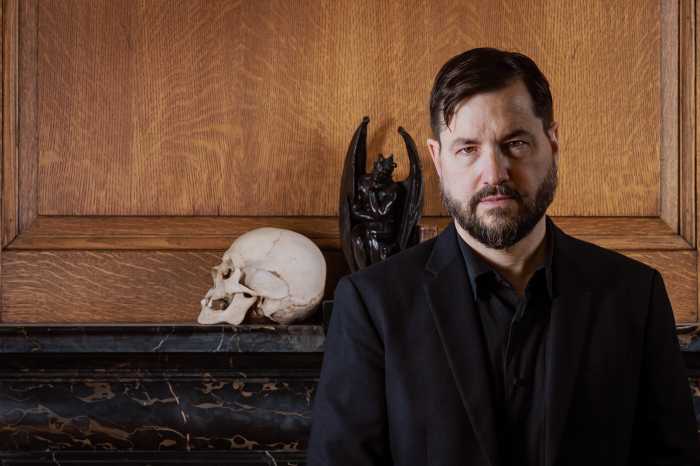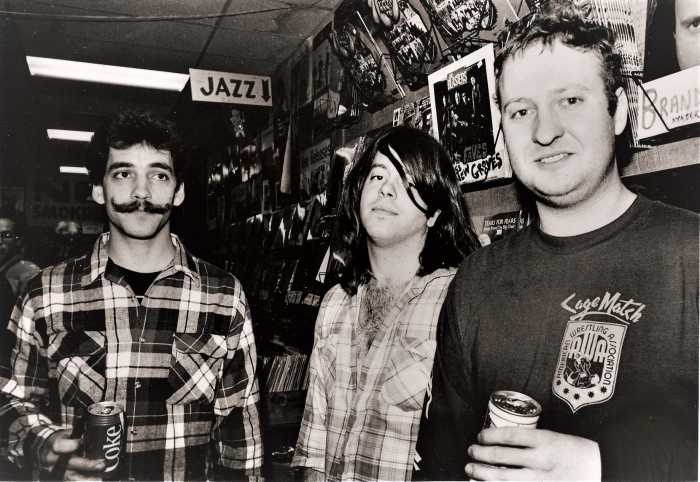Michele Angelini and Liam Bonner in “Le roi malgré lui” at Bard’s SummerScape. | CORY WEAVER
When the Metropolitan Opera season ends in May, opera-addicted New Yorkers have to travel out of town to get their fix. Luckily, a few hours drive from New York City are the Caramoor Festival and Bard’s SummerScape, which provide unusual and stimulating operatic fare.
Will Crutchfield’s “Bel Canto at Caramoor” series followed up the Rossini rarity “Ciro in Babilonia” with a concert presentation of Vincenzo Bellini’s much more familiar “I Capuleti e i Montecchi.” The raison d’être for the presentation was to showcase two rising American singers –– the Cuban-American coloratura Eglise Gutiérrez and the striking mezzo Kate Aldrich. Unfortunately, both disappointed.
Aldrich, a vocally successful Carmen at the Met two seasons ago, sang her first Romeo after an absence due to pregnancy. Her once rich, medium-sized mezzo has lost focus, tonal core, and projection throughout the range. The low notes were weak, the middle woolly with a sour edge, and only a few clear high notes emerged. She was frequently covered by the orchestra and in ensembles. I wondered if the singer I was hearing was actually a short soprano singing in the wrong range.
Gutiérrez goes from dazzlingly accomplished to clumsy and jejune from phrase to phrase. The basic instrument is fuller and creamier than most coloraturas, with a smoky sensuality in the middle and a spinning, shimmery fast vibrato above. Runs and trills flow easily and without strain. Her opening romanza “Oh quante volte” was floated in a magical mezza voce with sensitive phrasing.
However, it soon became evident that piano-pianissimo was her default vocal mode. Bellini’s Giulietta has some dramatic moments, but Gutiérrez was unable to modulate from “float” to a more outspoken vocal manner. Her tone turned diffuse and weak as if stuck in the throat. One gets the sense of a gifted vocalist who has an incomplete sense of the full musical picture, missing the forest for the trees.
Crutchfield included the short arioso passage –– “Morir dovessi ancora” –– equivalent to Juliet’s “potion” speech in Shakespeare, that Bellini added to Giulietta's Act II duet with Lorenzo in the 1831 La Scala production. Gutiérrez seemed to wake up for a moment there.
Italian-American lyric tenor Leonardo Capalbo sang Tebaldo with an overly darkened, thick voice production that dulled the brighter overtones and limited his success above a high A. He eschewed several optional high C’s and sounded uneasy on the B’s.
Caramoor Young Artists Jeffrey Beruan and Benjamin Harris were hardworking and sonorous in the low-voiced duties of Capellio and Lorenzo.
Crutchfield and the Orchestra of St. Luke’s got an ovation for an atmospheric, passionate rendering of a prelude in Act II. They might have made a persuasive case for Bellini’s rousing Rossinian overture, which was unfortunately omitted.
Emmanuel Chabrier’s 1887 opéra-comique “Le roi malgré lui” is a connoisseur’s delight –– the music sparkles and effervesces with a surprising kick like vintage champagne. However, as in a lot of beloved Broadway cult flop musicals, a glorious score is lavished on a book that simply doesn’t work. The convoluted plot concerns French Prince Henri’s attempts to evade assuming the Polish throne and get back to France. Internal logic and comprehensibility go by the wayside with stock situations concerning mistaken identity, disguises, and bedroom farce antics.
The piece works best in audio recordings; the 1984 Erato recording under Dutoit is now a prized collector’s item. Several attempts have been made to revise the book, but without success.
In 2005, Leon Botstein conducted the work in concert with the American Symphony Orchestra at Lincoln Center, and he initiated a fully-staged production at this year’s Bard College SummerScape Festival. Director Thaddeus Strassberger, a rising star on the international opera circuit, edited the dialogue and updated the action to the mid-20th century Cold War era. A Polish man in a tiny apartment watched what seemed to be a tacky old movie musical on a TV set with rabbit ears; the movie then came to life onstage. Strassberger attempted to solve the flimsiness of the book by adding more absurdity, artificiality, sex, and sight gags. Essentially, he was parodying a parody –– everything was self-consciously theatrical and absurd, undercutting any real emotion.
The one genuinely touching character, Minka, a serf maiden who loves the French nobleman Nangis, was turned from a loving girl in trouble to a sexy double-agent cum cabaret/ TV star. Her arias became floor shows with dancing girls and mid-number costume changes. Andriana Churchman flaunted sensational gams and gleaming high notes, but when she sneaked into the King’s bed in a piece of added business, the character lost all emotional credibility. I wasn’t bothered by the changes to a book that is silly and unconvincing in the first place, but what was added distracted from rather than strengthened the piece.
Strassberger, however, has a terrific way with singers, and an attractive young cast shone with lots of precisely executed comic business and detailed byplay. Liam Bonner’s light baritone and suave good looks suit the operetta genre, and the unflappable Roi Henri showed well. With easy bright high notes, tenor Michele Angelini managed to bring sincere romantic feeling to Nangis. Churchman looked and sounded sensational as Minka. Nathalie Paulin as a visibly pregnant Alexina sang with a tart but colorful soprano, bringing real French style and diction. Frédéric Gonçalves also had Gallic flair as the buffoonish Italian courtier Fritelli.
Botstein leading the American Symphony Orchestra can’t match Dutoit for French style and sparkle, but he did relish every harmonic twist and musical joke. I suspect we won’t be hearing “Le roi malgré lui” often, but Chabrier’s music cannot be dismissed or forgotten.




































